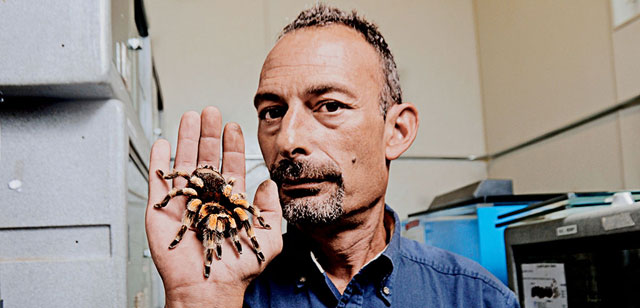sierraclub.org - sierra magazine - jan/feb 2012 - the bug whisperer
 Louis Perrotti, Hope Valley, R.I.; director of conservation programs, Roger Williams Park Zoo | Photo by Gale Zucker
Louis Perrotti, Hope Valley, R.I.; director of conservation programs, Roger Williams Park Zoo | Photo by Gale Zucker
THE BUG WHISPERER
"I've been bitten and stung by so many insects it doesn't even faze me anymore—although I took a sting from a bullet ant in Panama in 2007 that dropped me to my knees. They're called bullet ants because it feels like getting shot.
"I get jazzed by insects' diversity and their relationships with other things, like frogs. You've got caterpillars that secrete a goo that weaver ants feed on, and in turn the ants serve as protection for the caterpillar.
"Very little conservation is aimed at creepy- crawlies. It's a shame, because a third to half of amphibians worldwide face possible extinction in our lifetime. Panama's getting hit especially hard. In 2007 we went down there to help the El Valle Amphibian Conservation Center, where they were trying to save the most-threatened frog species. Every night biologists were capturing hundreds of insects to feed these frogs. I said, 'Jeez, they're going to overcollect these insects.' Plus, they were shipping in crickets and fruit flies, which raises invasive-species issues.
"So we asked them to show us which insects the frogs relish. Then we'd go out in the field and see what the bugs fed on and where they laid their eggs, which is key to figuring out how to breed them in captivity. Now they've got breeding facilities set up for katydids, wood lice, springtails, earthworms, mealworms, crickets, and fruit flies.
"Back home, I thought it would be fantastic if we could also get Rhode Island citizens to survey frogs in their own backyards, to track negative or positive trends. So far, we've trained more than 400 people who monitor frogs all over the state.
"I don't want my grandchild to ever come up to me and say, 'There's no more frogs. I would have loved to have seen a frog. Why didn't you guys do something about the frogs when you had a chance?'" —interview by Sara Martel
FROGS WITH FLOURISH Considered extinct in the wild, the Panamanian golden frog endures in captivity. The species uses hand-waving to communicate and socialize in the vicinity of loud water flow.
ON THE WEB Learn more about the conservation programs at amphibianrescue.org and www.rogerwilliamsparkzoo.org/conservation/main.cfm.